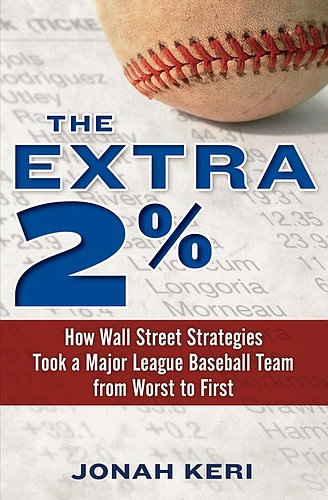With the Tampa Bay Rays trying to maintain first place in their division so far in 2011, it's a bit of a miracle that the team is still here.
In its first 10 years, Tampa Bay's major league team -- then known as the Devil Rays -- lost a combined 972 games, averaging nearly 100 losses a season. In 2002, the team lost 106 times, representing 66% of its games.
But something happened after that first decade of ineptitude. And in 2008, after 10 years of downright pitiful play, the newly rebranded Tampa Bay Rays made it to the World Series.
Now groups such as the Greater Tampa Chamber of Commerce, led by Sykes Enterprises Inc. President and CEO Chuck Sykes, suddenly find themselves working to find private financing for a new stadium to keep the Rays around. (Despite the team's newness, Tropicana Field is the ninth-oldest stadium in MLB, having opened in 1990.)
So what happened? According to Jonah Keri, author of a new book titled, “The Extra 2%,” the turnaround had as much to do with changes in the Rays' boardroom as it did with changes on the baseball field.
To be sure, Keri's offering is a sports book first -- that's a baseball on the cover, not a banker. But the frequent Wall Street Journal and New York Times contributor offers a compelling argument that traces the root of the franchise's latest success to a transfer of power between two men: Vince Naimoli, the Rays' original owner and a former turnaround specialist who thought he could “outcheap” rival team owners and Stuart Sternberg, a Wall Street veteran whose ongoing search for marginal advantages gave Keri's book its title.
Keri's depiction of Naimoli centers on two key character traits: his propensity for penny-pinching, and his bold bravado. “Vince Naimoli was Ebenezer Scrooge,” Keri writes, “and he was damn proud of it.”
Those qualities can be valuable in some arenas; for example, in the 1980s, Naimoli turned a substantial profit on the purchase and subsequent sale of Anchor Glass Container Corp. But in baseball such qualities worked against him.
Keri argues that Naimoli's clashes with locals over relatively small amounts of money hurt the team's image. Like the time he demanded $750,000 from the Visitors Bureau in St. Petersburg after the group used the Devil Rays' logo on its visitor's guide; or when he sued the Pinellas County property appraiser in 1999 over a $38,571 tax bill.
“Naimoli's problem,” the author ultimately concludes, “was that he never knew when to quit.” The former owner's “obsession with getting the best deal led to requests ... that others saw as ridiculous, if not insulting.”
That obsession, Keri writes, would dissipate with the arrival of a new owner. Between 2004 and 2005, Stuart Sternberg spent $70 million —earned after Goldman Sachs bought Sternberg's firm, Spear, Leeds & Kellogg, for $6.3 billion — to obtain a controlling interest in the Tampa Bay franchise. Then, between the 2007 and 2008 seasons, Sternberg and his staff would combine a rebranding overhaul (the “Devil Rays” became the “Rays”) with a 17% increase in spending on sales and marketing to change the Rays' public perception.
Just like that, the Rays were in the World Series.
Of course, it wasn't so simple. The team's baseball operations, including new approaches to the amateur draft and free-agent signings, played a huge role in improving the on-field product. And winning ball games is what ultimately draws fans to the park.
Still, the business lesson to which Keri points is valuable for any business: Getting a great deal just for the sake of saving money isn't always the best way. Sometimes, effectively investing in the development of one's business can lead to long-term growth.
On the interior of its book jacket, “The Extra 2%” bills itself as, “an informative and entertaining case study for any organization that wants to go from worst to first.'” Keri delivers on that sell, in a way that should appeal to even the most casual baseball fans in Tampa Bay as well as to CEOs determined to make it to the top.






